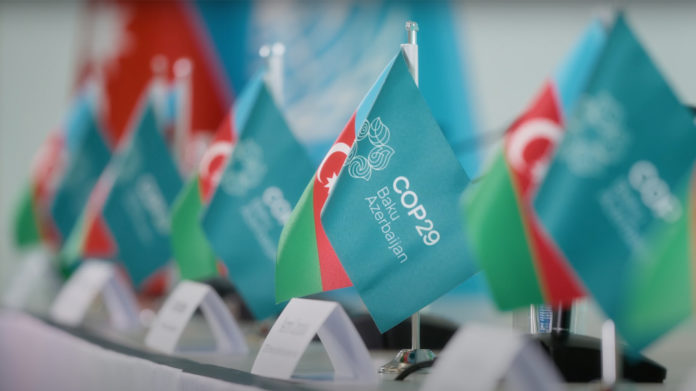COP29 will focus on defining new climate finance goals, enhancing emission reduction targets, and evaluating progress. For developing nations like Pakistan and Afghanistan, the summit is a pivotal opportunity to showcase their climate vulnerabilities and secure global support. Moreover, Pakistan can leverage its regional leadership to support Afghanistan’s climate adaptation efforts through strategic partnerships. The summit aims to drive stronger commitments and collaborative actions by participating countries for a low-carbon future.
On the western shore of the Caspian Sea, in the city of Baku- the world is all set to witness, yet another momentous occasion centered around climate change – COP29.
COP (Conference of Parties) is a global convention under the United Nations Framework Convention on Climate Change (UNFCCC) consisting of nearly 200 countries; all gathered to impart knowledge and negotiate agreements while developing global policies to maintain a healthy biosphere and a sustainable future. The main aim is to prevent harmful human interference with the environment – primarily by stabilizing GFG emissions.
For nearly three decades, COP has been a significant annual event, and this year, its 29th summit will be hosted in Baku, Azerbaijan from November 11-24, 2024.
The newly appointed COP president-designate, Mukhtar Babayev (Azerbaijan’s minister of Ecology and natural resources) has published a letter presenting his incoming presidency vision “to enhance ambition and enable action”. This summit will build upon the momentum of COP28, 2023. However, this year the key focuses are:
- Defining a new climate finance goal
- Motivating nations to elevate and upgrade emission reduction goals
- Assessing progress against existing goals.
Additionally, emphasis is being placed on establishing a transparent framework for funding and responding to damage/loss, notably for developing countries.
While globally, this appears as just another climate event, for developing countries like Pakistan and Afghanistan- It’s a crucial turning point!
The intensity of the climate crises positions both nations at the forefront; facing challenges that require prompt response. The outcome of COP29 extends beyond a few enhanced policies; it holds the potential to impact the future of millions residing in this region, making it an inescapable event for both countries.
Pakistan, despite contributing less than 1% of the world’s carbon footprint, has been severely impacted by climate change.– The disastrous floods (2022) led to substantial economic losses, mortality, and displacement of more than 30 million people. The situation has only worsened since then with the country experiencing severe heat waves in 2024, particularly in Sindh where the temperature rose to almost 52.2C (126 F) – approaching the country’s record high of 54C (129.2 F). This raises red flags as per reports, ‘heat stress’ is presumed to lower labor productivity by 7% further decreasing the country’s economic output and efficiency. Moreover, Pakistan’s agricultural production has been greatly disrupted by the ever-fluctuating climate situation; temperatures have risen, precipitation patterns have changed, and thus, the frequency of extreme events has increased. These factors have caused a 20% reduction in crop yields, e.g. rice, cotton, and wheat production. This decline has heightened food insecurity across both urban and rural communities, and more specifically, farmers whose living standards are directly proportional to their harvest output.
Acknowledging the country’s escalating climate challenges, Pakistan’s climate mission is earning increasing attention – particularly in light of the forthcoming COP29 summit. Being an international event, COP 29 can pose as a global stage for Pakistan; showcasing its climate vulnerabilities and efforts, garnering global support, and building strong alliances. The conference provides an opportunity for Pakistan, to highlight its achievements, securing international funding to help tackle climate disaster management and invest in inter-country initiatives, preventing further losses triggered by climate change. However, the country’s participation success rate depends heavily upon having strong policies and tangible actions in place, as directed by the Supreme Court of Pakistan- to make good use of this opportunity.
According to Pakistan’s Ministry of Climate Change and Environmental Coordination, Azerbaijan’s Ambassador met with Pakistan’s Climate Change Secretary in Islamabad, on 6th April 2024 to strengthen ties and collaborate on COP29, with 2024 declared as the “Year of Solidarity for a Green World” in Azerbaijan.
In addition to pursuing its own climate goals under this cooperative framework, Pakistan’s participation in COP29 will also prove equally beneficial for neighboring countries like Afghanistan, which is currently facing a dire situation, including a climate crisis, humanitarian emergency, and major security challenges. In 2022 alone, the country faced climate-related losses of over $2 billion, with little scope for recovery in the near future.
As a regional leader, Pakistan is well-positioned to support Afghanistan’s climate adaptation efforts through a strategic partnership at COP29. This collaboration can address critical issues like transboundary water management, glacier melting, and climate-resilient agriculture, driving economic growth and innovation.
In summary, COP29 serves as a grand stage for developing countries like Pakistan and Afghanistan to embark on the journey towards a climate-resilient future. The platform offers a unique opportunity for both nations to highlight their climate and financial vulnerabilities whilst unlocking new avenues for economic growth and sustainable development. With the 1.5°C temperature limit looming (Paris Agreement goal), COP29 must catalyze bolder commitments and actions to accelerate a low-carbon transition. Ultimately, the success of this event hinges on a collective effort from all participating countries, driven by a genuine intention to act, adapt, and innovate in the face of the climate crisis.




